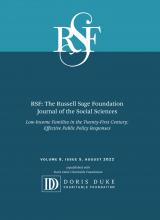Abstract
Childcare instability can negatively affect family well-being. Yet not all childcare changes are bad for families. This qualitative study (N = 85) examines work, family, provider, and subsidy-related factors contributing to childcare changes among families with low incomes. We focus on the desirability—the extent to which parents wanted to leave their provider—and the planned nature of childcare changes—the extent to which parents anticipated the change and had time to plan. We find that although nearly all desired changes were planned, undesired changes were both planned and unplanned. Planning was important but not enough for finding care that aligned with family needs, and undesired changes, especially sudden changes, were often driven by the loss of a childcare subsidy, sometimes accompanied by a job loss. We discuss how these findings can help researchers and policymakers understand the implications of complex childcare trajectories for family well-being and early care and education policy.
- © 2022 Russell Sage Foundation. Pilarz, Alejandra Ros, Heather Sandstrom, and Julia R. Henly. “Making Sense of Childcare Instability Among Families with Low Incomes: (Un)desired and (Un)planned Reasons for Changing Childcare Arrangements.” RSF: The Russell Sage Foundation Journal of the Social Sciences 8(5): 120–42. DOI: 10.7758/RSF.2022.8.5.06. The authors gratefully acknowledge funding provided by the Office of Planning, Research, and Evaluation in the Administration for Children and Families, U.S. Department of Health and Human Services under Grant 90YE0133. The contents of this article are solely the responsibility of the authors and do not represent the official views or endorsement of the funding agency. We especially thank study participants for contributing their valuable time to this project. We are grateful to Carolyn Barnes, Sarah Bendix, Daysi Diaz-Strong, Jaimie Grazi, Olivia Healy, Jonathan Holmes, Sandra Huerta, and Jaeseung Kim for research assistance; and to our Illinois and New York State and regional partners for project collaboration, especially Linda Saterfield, Janice Molnar, Maria Whelan, David Alexander, Marcia Stoll, Kimberly Hunt, SuzAnne Kollmann, Melinda Denham, Justine Hanif, and Iris Rivera. Direct correspondence to: Alejandra Ros Pilarz, at pilarz{at}wisc.edu, Sandra Rosenbaum School of Social Work, University of Wisconsin–Madison, 1350 University Ave., Madison, WI 53706, United States.
Open Access Policy: RSF: The Russell Sage Foundation Journal of the Social Sciences is an open access journal. This article is published under a Creative Commons Attribution-NonCommercial-NoDerivs 3.0 Unported License.






